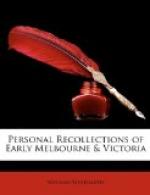This disappointment led to a search, begun in 1832, under the lead of Edward, the second son, who twice traversed the seas between Portland and Spencer Gulf, examining the aspect and promise of the country. The result was always in favour of Portland, where he landed on one occasion, confirming all impressions by actual inspection ashore. He, therefore, resolved on a settlement here. In his second expedition he took his father with him, as the latter had expressed the wish to see for himself the Swan River grant before finally abandoning it. The party, having reached the Swan, found that what they had got was “sand, not land,” and so it was finally given up.
Edward, who was the prime adventurer of the party, now got ready to settle at Portland Bay. He chartered a small schooner, “The Thistle”, loading her with stores and live stock, and with selections of seed, fruit trees, vegetables, etc., part of them bought from Fawkner, who had then a market garden on Windmill Hill, near Launceston, besides keeping the Cornwall Hotel there; and with these he sailed in October, 1834. In two days they were within twenty-five miles of their destination, when a storm drove them back to King’s Island. Six times successively they were thus driven back, losing a good many of their live stock, and it was only after thirty-four days that they effected their landing. The work of colonization began at once. “The Thistle” returned to Launceston for fresh supplies and additional colonists, and returned this second time with Francis Henty, the youngest of the family, who landed at Portland on 13th December, within twenty-four days of his brother. Edward was then twenty-four years of age, and his brother only eighteen. This is the brief but momentous story of the founding of Victoria.
Mr. Francis Henty has given a most amusing account of the meeting between his party and that of Major (afterwards Sir Thomas) Mitchell, who, in exploring “Australia Felix,” in 1836, came, in great surprise, upon the Henty settlement at Portland. The story reads now like the highest romance of adventurous exploration. The Mitchell intruders, five in number, were at once regarded as bushrangers, and a defence promptly organized. The fire-arms were limited to an old musket, which was loaded to the very muzzle, to be ready for a grand discharge. Then as to the Mitchell party, even after they were relieved of their first fears, for they too had taken the others to be “no better than they should be,” they exercised a measure of reserve, as though doubtful of their new friends’ respectability. Mutual suspicions, however, being at last dismissed, the travellers were supplied with the stores they much wanted, and, in return, they gave such a favourable account of the pastures of the Wannon Valley as to induce Mr. Edward Henty subsequently to remove a part of the flocks there, and to establish the homestead where, as I have already stated, I enjoyed in my Western Victorian travels the squatting hospitalities.




